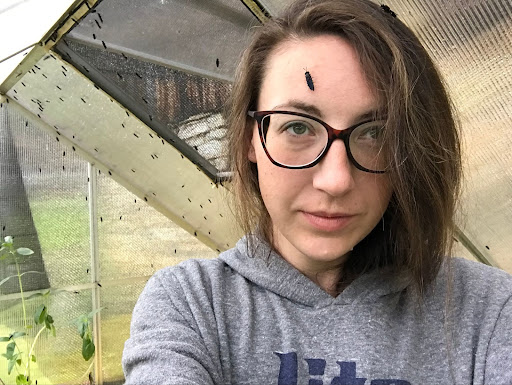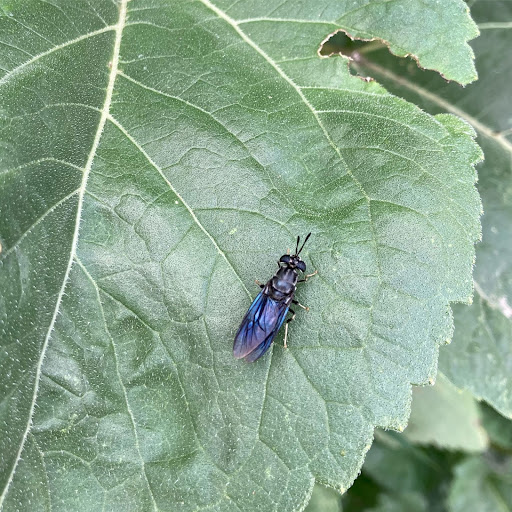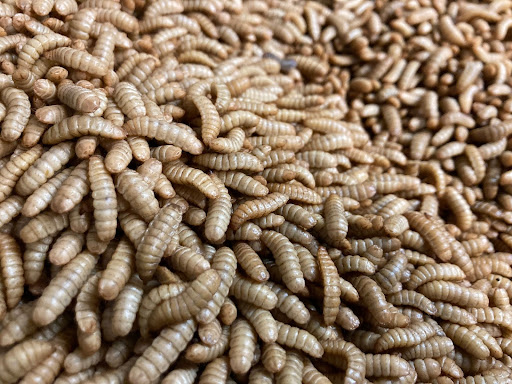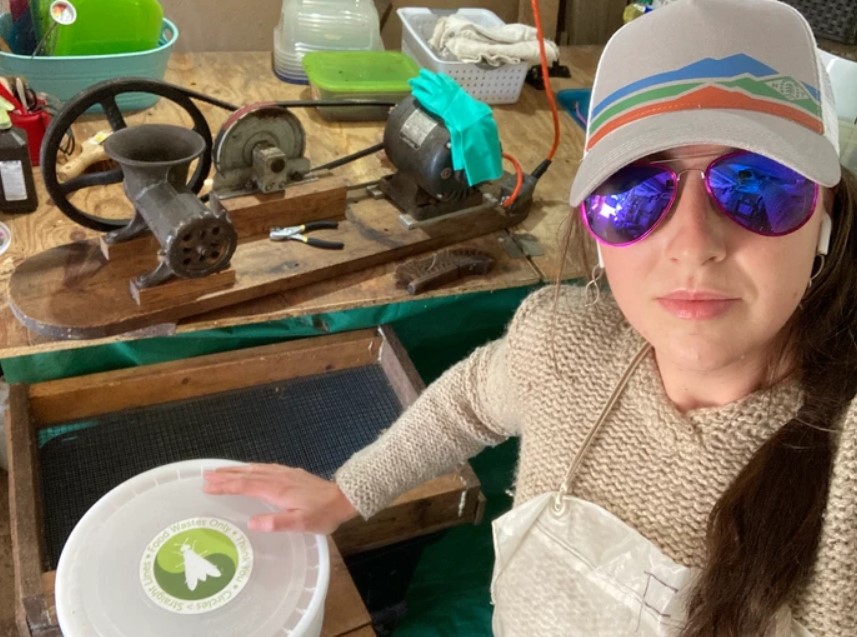Full Circle Bioconversion uses fly larvae to transform food scraps
By Aubrey Fornwalt, owner of Full Circle Bioconversion LLC
As a child, the Pennsylvania woods were my playground and the stream was my pool. I grew up climbing trees, catching crayfish and playing in the mud. Then I got older, went to college and got a desk job. And it made me very unhappy.
After I turned 30, I made a life change that led to my return to my childhood home in Lycoming County, with the same woods and stream in the backyard. I had decided to pursue composting, specifically for food scraps. (Prior to that, I was a professional graphic designer.)

One does not simply start a composting business. I had weighed all the logistics for a big operation with a concrete compost pad with heavy equipment, and it felt like a big risk, considering that it very well might not be successful with so much money invested up front. So more research led to the discovery of a certain species of fly larvae that is used in other regions to dramatically reduce the volume of food scraps. This new approach resonated with the spirit of the little girl who didn’t mind the bugs and critters of her childhood. This is how I began my black soldier fly journey.
So in 2016, I bought some black soldier fly larvae on the internet, and I figured out how to become a fly farmer and how insect bioconversion transforms food scraps.
Of all the journeys to be on, why this one? Pennsylvania has this unique array of landscapes and lifestyles that really creates a slice of heaven for pretty much anyone. The woods, the country hills, the farms, the cities: they’re all unique in their offerings to the residents of this commonwealth. We have this amazing opportunity to link them all together by being mindful of one of our most basic needs. There is a tragic amount of food that is thrown away in landfills. The true “waste” of this potential resource was the act of throwing it into a pile where the food becomes methane and leachate. My goal is to create an easy service that caters to homes and businesses to help keep food scraps out of the landfill and retain it for our food system.

Below: Watch how the larvae disappear some burgers and sandwiches!
By using these larvae, I can bring in any food scrap material. There is very little that these larvae won’t eat, and they even prefer breads, meat and dairy. My “do not include” list is very short. However, If I found a way for them to consume produce stickers, I would be a millionaire. (Please remove your stickers.)
A great feature of using these insects to aid in the composting process is the added products that become available. Yes, compost is great for gardens and landscapes, but so is the larvae manure, also known as “frass.” If I bring in about 1000 pounds of food scraps a week, about 60-75 pounds of frass accumulates in that week. And for anyone who enjoys feeding birds or chickens, the larvae are available in dried form to supplement any protein or fat needs in their diet. Bonus feature: if squirrels plague your feeders in the winter time, they don’t like larvae.
It should be noted that this fly is a non-vector because it does not eat. It will not bite or sting because it simply can’t. At about an inch in length, its only defense mechanism is that it might resemble a wasp, but it is very docile. It lives only 4-7 days to mate and lay eggs, seeing the species to another generation. Because the adult stage is so short, the larvae are voracious and will consume the calories necessary for the adult fly.

In 2018, Full Circle Bioconversion LLC was formed, and in July 2020, it was officially permitted through the Department of Environmental Protection to begin composting food scraps via black soldier fly larvae. As I write this, I have diverted over 117,000 pounds of food scraps from the landfill since 2020. (That statistic is updated regularly on www.fullcirclebioconversion.com.) And I work with local restaurants who value the importance of keeping food within its intended cycle: Kathy’s Cafe in Hughesville, Bullfrog Brewery in Williamsport and Tag’s Takeout in Williamsport.
Maintaining an insect-centric operation through the four seasons here in Pennsylvania is challenging, but it is very possible. I’ve experimented with tapping into the heat generated from the compost pile to heat water (see the video below) as well as larvae themselves to maintain a warm space even in the winter months.
Below: Video of Aubrey explaining how water can be heated by a compost pile
Some other specifics about this black soldier fly larvae operation:
- 800-1000 pounds of food scraps come in weekly
- 50-80% of that volume is reduced – converted into frass (larvae manure) and larvae
- 12’x12’ room is the room size that this food scrap reduction primarily takes place in
- 12’x12’ aerated static compost pile manages any residue from the larvae bins and other material the larvae can’t consume
Below: Watch as the larvae consume wrapped Hershey’s kisses!
Tapping into biological solutions – such as composting and insect bioconversion – opens up a tremendous amount of opportunities to work with nature. This operation is a resource management solution in a small land footprint that can help divert food scraps from the landfill while creating resources that will feed our future selves. Our land will rebound with resiliency when we prioritize our soil health, and those benefits will expand broadly from farm to table back to farm. It is a circle – as nature intended.
About the author:
Aubrey Fornwalt is the owner and founder of Full Circle Bioconversion LLC, located in Williamsport, PA. Full Circle Bioconversion LLC is both a compost hauling service as well as a compost facility. It offers service to homes and businesses and offers compost, frass and larvae for sale. Any questions or requests can be sent to aubrey@fullcirclebioconversion.com



